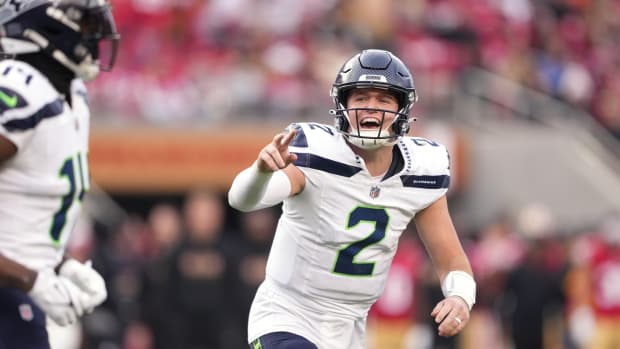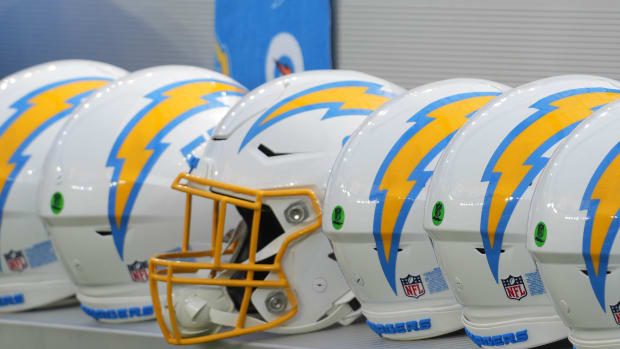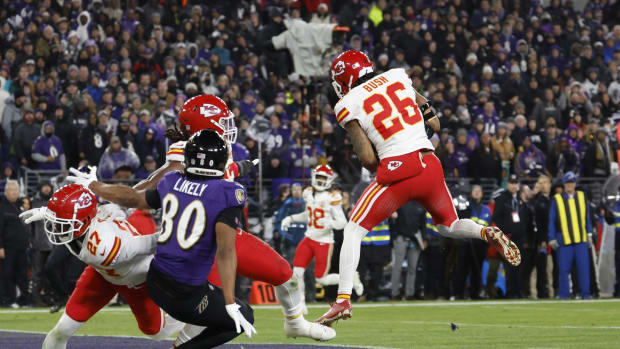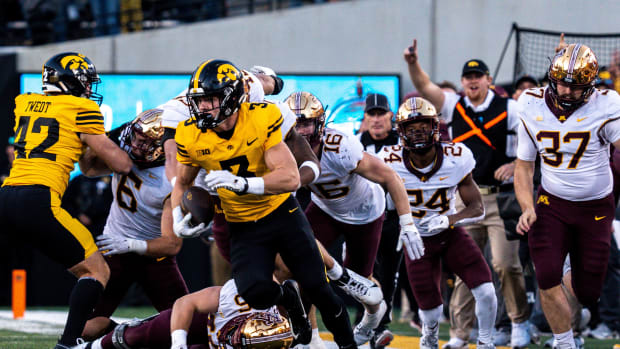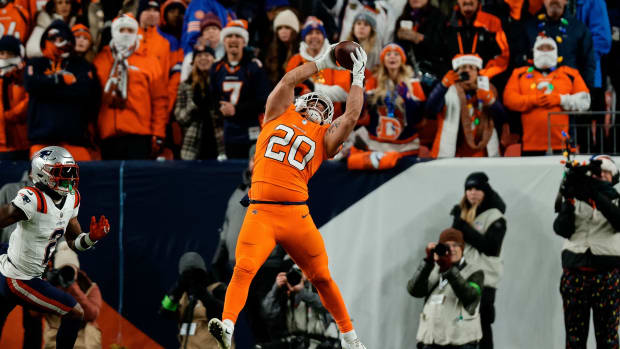Peyton's arm and conservative Broncos; catching up with Reid; mail

The loss to the Ravens Saturday dropped Peyton Manning's record in the playoffs to 9-11.
Jack Dempsey/AP
Five items, a sort of mini-MMQB, for a Championship Week Tuesday ...
What's up, exactly, with Peyton Manning?
Let's start with all the chatter about Peyton Manning, the conservative Denver playcalls, etc., coming out of the Broncos' 38-35 loss. Reader Jeff Keith of Charlotte asks: "You mentioned that Manning should have loosened up Baltimore's defense in the second half with some deep throws. I have watched Manning throughout the season, and I have little doubt that he cannot throw the deep ball anymore post injury. I wonder what the stats point to regarding the distance the ball covers in the air on Manning throws this year versus his career numbers?''
According to ProFootballFocus.com, here are the percentages of Manning's throws 20 yards or farther past the line of scrimmage (attempts, not completions) since 2008:
2012: 12.3 percent.
2011: injured.
2010: 13.5 percent.
2009: 12.8 percent.
2008: 13.2 percent.
So, not that different. But with the CBS report Saturday -- which I didn't hear about until Monday -- about Manning having some trouble with numbness in his fingertips, the question makes sense. I had a minute alone with Manning postgame and would have asked him about it had I known. But it's something to keep in mind as Manning continues to recover from his four neck surgeries. You can see the number of throws downfield is down slightly -- very slightly -- so I don't believe it's a significant difference there.
Bottom line: With 31 seconds left in the fourth quarter in a tied playoff game, one of the best quarterbacks in history had the ball with two timeouts, needing about 47 yards to be in field goal range. You've got, what? Five plays to make 47 yards to get in position for a field goal? I know the conditions were lousy: frigid day, a Ravens defense playing well, Manning having had a good but not great day to that point. If Manning went to John Fox and said, "I'm really struggling, so let's sit on it here,'' that's fine. If not, I don't understand the decision, and never will.
***
On the CTE discovery in the brain of Junior Seau.
With the ABC/ESPN report last week that Junior Seau's brain contained evidence of brain disease caused by multiple hits to the head, it is now imperative, obviously, that the league do as much as possible for the mental health of ex-players -- and that efforts continue to remove helmet-to-helmet hits from the game.
I also think, other than chronic traumatic encephalopathy (CTE), there are other causes to be considered -- namely, depression and post-career transition, both of which could have been major points of emphasis in the decline and death of Seau. This morning, I spoke with former Lions quarterback Eric Hipple, now an outreach specialist with the University of Michigan's Depression Center. He's a victim of depression himself, and his 15-year-old son killed himself in 2000 after suffering from depression. He was between sessions, he said, with a former NFL player who is depressed. That shouldn't be a surprise, he said, given the results of a NFL Players Association poll of former players, in which 15 percent of 1,600 players polled said they have felt moderately to severely depressed since the end of their careers; the national average for men is about nine to 12 percent.
"There is no doubt in my mind that CTE creates problems with some former players, and it's a contributor to depression for sure,'' said Hipple. "CTE certainly can exacerbate depression. But CTE has become a catch-bag for every problem now, and I don't think it should be. Jovan Belcher happens [the murder of his girlfriend, and Belcher's suicide], and everybody wonders if CTE did it. There is simply no data to confirm that CTE is the dominant reason for suicide.''
Hipple believes the transition from a football life to a civilian one is the most difficult one to handle.
"When players leave football, I've found almost every one goes through a process of thinking, 'What do I do now? What's my identity now?' Their support system was taken away. All of a sudden, the support system, the friends, the money, the identity, is gone. If I want to see a doctor, I've got to make an appointment; I don't have a doctor available to me at all times. It's pretty devastating when you get cut. Or you get injured, and you're released. But nobody ever talks about it. It's a traumatic event. Look at research on ostracism. Psychologically, it's tough. That in itself can lead to depression.
"Then you get out in the world, and, let's say you've been in the NFL for eight years. You find yourself competing for a job against people who have been in the line of work for eight years. You've been working hard on football, and now you're way behind everyone when you go out in the field. Then you add the chronic pain, which some players have. And people saying to you, 'You played the greatest game in the world? I would have done anything to be able to do that. What can be wrong with you?' ''
Hipple's advice to the NFL (and he has spoken to commissioner Roger Goodell about this): The day a player gets cut, debrief him -- tell him about the post-career resources available to him, and emphasize mental health care; connect him to a post-career support system.
"I'm as mentally healthy as I've ever been, and it's because of education,'' he said. He wishes he could have had a chance to speak with Seau before his suicide last May -- but he says he wishes he could talk to every former player to tell them there's hope, even if a player has a brain injury, to deal with the depression that might be plaguing them.
CTE, Hipple believes, should be part of a mosaic of the post-career player issues. But it shouldn't be the only thing experts study when lives go so tragically wrong.
***
Four questions with Andy Reid ...
Not long before the end of the season, I wanted to ask Andy Reid whether he'd be interested in writing something around the time of the Super Bowl for Sports Illustrated. He said no -- even though in his youth he wanted to be a sportswriter. He thought he might be otherwise occupied. I'd felt he wouldn't take a year off from coaching up to that point, but then I knew if there was a job out there, he'd want it.
Q: So, since you've been named the Chiefs' coach, many people wonder: 'With everything you've been through -- your son Garrett's death by overdose, the turbulent year on and off the field you just went through -- why not take a year off to recharge and get your life back in order?
Reid: "Because I love what I do. Garrett loved what I did. It doesn't feel like work. I didn't want to sit home and not coach. What was I going to do? There was nothing I wanted to do as much as coach football. The thing with Garrett ... it was not very sudden; this was a long, long process. Unfortunately, [drug addiction] is so rampant in America, and people who have gone through it realize that you don't just -- as in my case -- lose a son; you lose a great friend. Now I'm able to bring my other son here. [Reid hired Britt Reid, who also had drug-addiction issues, to be a Chiefs quality-control coach.] Remember, he lost his best friend. But I am so proud of how far he's come. And it says something about him that the three coaches he worked for at Temple wanted him to come with them. The other side of this is working to move on like a man and handle what life throws at you. We're doing that.''
Q: Why the Chiefs? Why not, say, Arizona, or the other places you were linked to?
Reid: "The Hunt family is one of four or five bedrock families in the NFL that I always thought, 'If I'm ever released [by the Eagles], if one of those families calls, I'd listen.' The history here is so rich, the tradition is so rich, the fan base is so strong.''
Q: What's the one overriding thing you take from Philadelphia into this job?
Reid: "I learned to embrace a city in Philadelphia. They'll take you from boyhood to manhood, which they did with me, and that's okay. It's a results business. I got that. As far as the team goes, it's imperative that everybody's pulling in the same direction. That's the only way you can succeed."
Q: What's your take on the talent you inherit?
Reid: "Before I interviewed with the Chiefs, I looked at every snap from every [Kansas City] game this year. Special teams were average. The talent overall, it looked to me like they were transitioning from an older team to a younger one. And I thought, 'With a couple, three drafts, very good things can happen here."
***
I don't know precisely what this means, but I like it.
Rob Chudzinski, named Friday as the seventh head coach in 14 new Cleveland Browns years, was an offensive coordinator for four years in the NFL -- two with Cleveland (2007-'08), two with Carolina (2011-'12). And I would bet his greatest win as a coordinator came in October 2008, when the struggling Browns welcomed the unbeaten Giants to Cleveland Browns Stadium for a Monday night game -- and Chudzinski's offense piled up 454 yards and routed the Giants 35-14.
I bring this up because I tried to reach Chudzinski after the game by phone to speak about it, failed, then went to bed around 1, figuring I'd catch him sometime during the week. Well, at 1:45 a.m., my cell phone rang. It was Chudzinski. He was in his office, at the Browns training facility in suburban Berea, starting to work on that week's foe, Washington, and we arranged to talk later in the week. I thought this said something either about Chudzinski the worker bee or coaches in general: The Browns have their biggest win in the Crennel Era, beating the unbeaten Super Bowl champs at home on a Monday night before a national audience, and the offensive coordinator's mode of celebration was to go watch tape of the next foe. When we spoke, he did say he watched three Washington defensive game tapes between about 12:15 and 4 that night before getting some sleep. Some coaches who have a Monday night game will spend a good part of Monday during the day getting a head video start on the next team, but Chudzinski won't do that because he feels it clouds his thinking if he looks ahead to the next foe before finishing with one opponent.
"It's just the job,'' he said then. "It's what the job is in the most competitive league in the world. I just like to watch two or three games and get a feel of the team we're going to play. See how we match up, see how they call the game. Just getting a feel for them. For me, I think, and I've always thought, this is just what I have to do. I just feel I need every waking hour to do this job right. You better not spend too much time licking your wounds or patting yourself on the back.''
That's your new football coach, Cleveland.
***
A Polian tree grows in the NFL.
In the span of 25 hours last week, three teams hired new general managers: Jacksonville named David Caldwell late Tuesday afternoon, San Diego picked Tom Telesco at midday Wednesday, and Carolina announced David Gettleman. All got their start in the NFL when hired by Bill Polian -- Gettleman in Buffalo, and Caldwell and Telesco out of John Carroll University (along with son Chris Polian) with the Carolina Panthers. "Bill's the linchpin for me and Tom,'' Caldwell said. "I would venture to say no, I wouldn't be here right now if not for Bill."
Said Polian: "All three are the epitome of football men. Football teams need to be led by football men who know how coaches think, how players think. You can't learn that in business school or law school.''
So much for capologists rising to GM jobs ...
Now for your email:
I AM BLUSHING. "Thank you for the peek into the locker room meeting between Peyton Manning and Ray Lewis. This is why you are appreciated by fans of the game. These are the types of revealing moments that fans long to see, but unfortunately they always occur behind the scenes where we cannot share in them. Reading how Mr. Lewis called Mr. Manning a great warrior was touching and revealing of the respect they have for one another, and I think this should not be lost on the players of today's generation. Mr. Manning displayed a lot of class to seek out and congratulate the victorious Mr. Lewis.''
-- From Kenneth Garrett, Covington, Ky.
I have covered the NFL for 29 seasons, and this is one of the coolest things I've seen in a post-game setting. These men will go down as two of the top -- whatever -- 20, 25, 30 players in history when they're finished, and the respect that they had for one another was a lesson for future generations of players. Thank you for writing.
ON RAHIM MOORE. "While I think it is correct to criticize the Denver safety Rahim Moore for allowing the 70 yard TD pass at the end of the Broncos-Ravens game I think it is completely unfair and unprofessional to suggest it was "laziness" as a possible culprit. You don't think that kid is heart broken over what happened? He screwed up big time but don't pour salt in his wound by suggesting he was lazy.''
-- From Rudy Dyck, of Kingsville, Ontario.
I said he was either lazy or had a lapse in concentration. It was one of the two, probably the latter. I understand your outrage, but how do you or I know which it was?
OUTRAGE OVER PETE CARROLL. "How do you write an entire column about the four games last weekend and not mention Pete Carroll's inexcusable icing of the kicker? First, statistics show it doesn't work. Second, he looked to be asking who called the timeout when it is pretty clear on replay that he is the one who called the timeout. Do you have any insight on this issue that cost them the game.''
-- From Chris Reagan, of Middletown, N.J.
No, I don't. I'm not a big icing fan. To me, as much damage can be done to a kicker by making him kick when he's a little bit rushed -- as Matt Bryant would have been before the timeout -- as by giving him 45 seconds to get his bearings and prepare. But I don't know who called it. If I were a coach, that would not be in my repertoire.
PEYTON'S PLACE. "It's unfortunate that we live in an era where an all-time great quarterback like Manning is routinely criticized for not being able to win the 'big one.' Despite the fact that he has won a Super Bowl, he seems destined to be treated as Marino, to Brady's Montana (another unfair comparison). Marino never had a defense or a running game. Saturday, Manning brought his team within a minute of victory, only to have it taken away by a poor defense. Montana played on teams so great on both sides of the ball that the backup (albeit another Hall of Famer) was able to step in and win. Likewise, all of Brady's Super Bowl victories came when he played on a team with a great defense, something the Pats have not had in their recent Super Bowl failures.''
-- From Dan, of New York City.
I'd agree, although Manning made a gigantic gaffe to help Denver lose this game. You can't overlook the terrible overtime interception. I blame Rahim Moore more than Manning, but the quarterback has to take his share of the blame when he throws an interception in overtime on a ball he knows he should never have thrown.
PEYTON AND THE PLAYOFFS. "For Peyton Manning, what I think is the most glaring statistic isn't the total number of playoff loses, it's the number of one-and-done games, most of which are at home as a top three seed. He's been knocked out of the playoffs eight times in the first game. Compared to the likes of Elway, Favre, Brady, that number is incredible.''
-- From Sean McCarthy, Boston.
Agreed. You can't hide that.

































